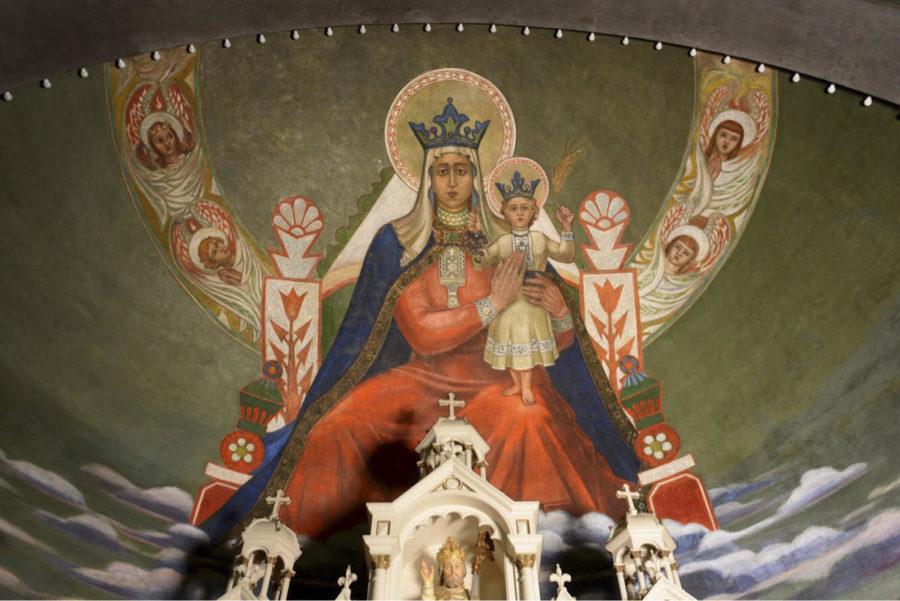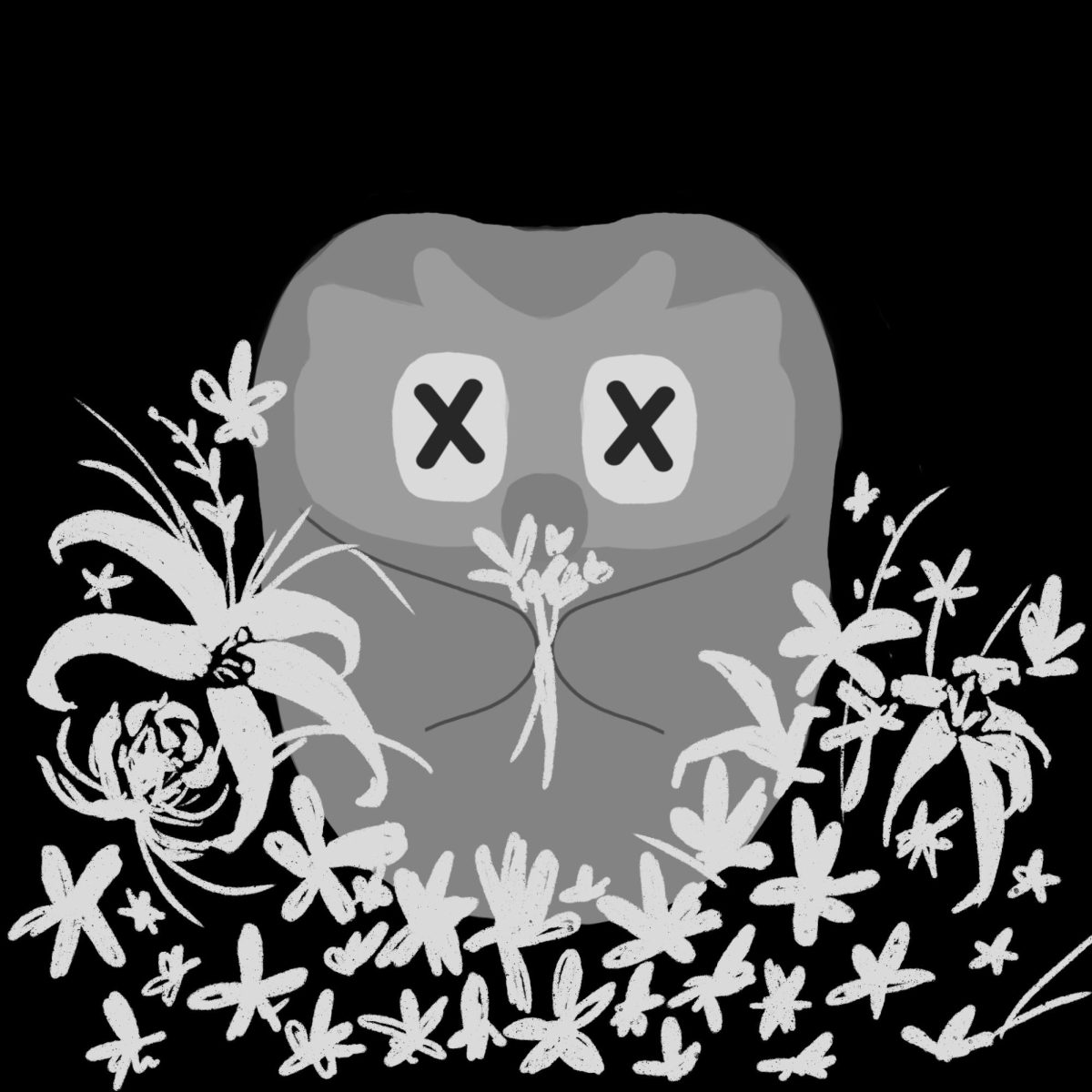Maxo Vanka’s legacy lives on in Millvale Murals
The mural “Mary, Queen of Croatians” is one of many created by Croatian artist Maxo Vanka in the nineteenth century. (Photo courtesy of Rob Long)
April 10, 2018
As a town known for its iron manufacturers and lumber mills, Millvale seems like an unlikely place to house a spectacular art collection. The former industrial borough — located at the northernmost tip of the Allegheny river trail across the 40th Street bridge — doesn’t boast much in terms of outward appearance.
Mimicking its surroundings, neither does St. Nicholas Croatian Church — one of two Catholic churches in Millvale that belong to Pittsburgh’s diocese.
But looks are deceiving in this case. Little do most Pittsburghers know, tucked inside that rundown, beige brick exterior lies an art collection that lures art enthusiasts from all over the world — the murals of Maxo Vanka.
In his only major undertaking, Croatian artist Vanka painted a stunning collection on the blank interior walls of the church — 25 murals created in two bursts in 1937 and 1941.
Vanka’s first painting — at the very front of the church — is somewhat traditional. He painted “Mary, Queen of Croatians” in regal Croatian garb, with Mary and Jesus both wearing crowns and surrounded by intricate, angelic imagery.
But viewing the collection of paintings as a whole reveals that Vanka’s masterpiece is far from traditional. While the church features ample imagery with larger-than-life stills of Mary and Jesus, just as many murals depict graphic violence and grinding poverty — and even overtly display anti-government sentiments.
Some picture Croatian peasants kneeling in morning prayer. Others show Christ on the battlefield — with Mary grabbing a soldier’s rifle in a fit of rage. Vanka’s “Justice/Injustice” is perhaps the most notable of his anti-war paintings. While he represents “Justice” using an ordinary angel, “Injustice” transforms that angel into a Darth Vader-like figure donning a black mask and weilding a blood-drenched sword.
Vanka doesn’t stop at warmongers — he skewers greedy corporatists as well. Featured prominently on the Vanka murals Facebook page, “The Capitalist” depicts a dejected black servant serving a luxurious dinner to a wealthy white business owner.
No one recognized these murals as special until the 1980s, when the church staged a play titled “Gift to America.” Theater lighting revealed the murals’ deteriorated condition and the potential of proper lighting. So in 1991, several church members — including lifelong St. Nicholas attendee Diane Novosel — helped develop the Society to Preserve the Millvale Murals of Maxo Vanka.
The society served a dual purpose — to protect the murals against weathering elements and to promote the murals to a wider audience outside the church.
Novosel — current docent and former president of the society — said Vanka, a self-described socialist, used his artwork to rail against social injustice.
“He tried to depict the struggles of the Croatian community — struggles he also faced as an immigrant,” Novosel said. “He wanted church members to be able to look up at the walls and see themselves embodied in every brushstroke.”
The society — a nonprofit organization separate from the Church — is taking steps to preserve those brushstrokes.
According to Anna Doering — managing director of the society — the ultimate goal is to turn the church into a fully functioning museum. The process for that includes fielding a team of conservators to repair the paintings from salt and heat damage and installing LED lighting to illuminate the paintings without harming them in the process.
“We have a core team of six conservators at the moment,” Doering said. “The entire process could take up to five years.”
But while the paintings are far from finished, tourists can rejoice in the fact that the church still offers tours every Saturday at 11 a.m. and 12:30 p.m.
Andrew Stefanick — docent manager and Pitt alumnus — believes everyone will find something they’re looking for in these murals because they touch on such a wide range of topics, from art to religious history and politics.
“The great thing about these murals is that they interest such a wide range of people,” he said. “In our tour groups, we had people ranging from Croatian tourists to students at local universities.”
The society boasts docents who cater to every perspective. While many tour guides only specialize in art history, some are actually active parishioners at the church — and can explain the religious significance behind every painting as well.
According to Stefanick, church attendees find the murals awe-inspiring. And with a 400 percent increase in tourism just last year, donations to the church have been trickling in — a community contribution most churchgoers certainly appreciate.
Novosel also values the society’s attempts to educate the church community — and Millvale more broadly — on the paintings.
“Before the society, when I was going to St. Nicholas as a kid, no one ever talked to us about the murals,” she said. “We knew they were unusual but knew nothing about their history or significance.”
Still, she admits the murals aren’t universally loved.
“Some people find the imagery too dark for church — an environment that’s supposed to be warm and inviting,” she said.
But even though some have scoffed at Vanka’s political message, Novosel believes the society’s concerted effort to promote Vanka’s artwork has raised an awareness and appreciation for the murals throughout Millvale’s Catholic community.
“To a certain extent, it’s bridged the divide between Catholics and non-Catholics, too,” she said. “Vanka wasn’t really pushing a political agenda — he was simply unapologetic about his socialist views and wanted to portray the authentic immigrant experience in America.”
Once viewers realize Vanka never intended to offend anyone, they can actually appreciate the murals’ historical significance — and, of course, soak in the spectacular imagery.
“There’s a real partnership [the society] has with the members of the church,” said Doering. “It’s their congregation first and our museum second — but really it’s a community center, so we try to preserve it as best we can.”



